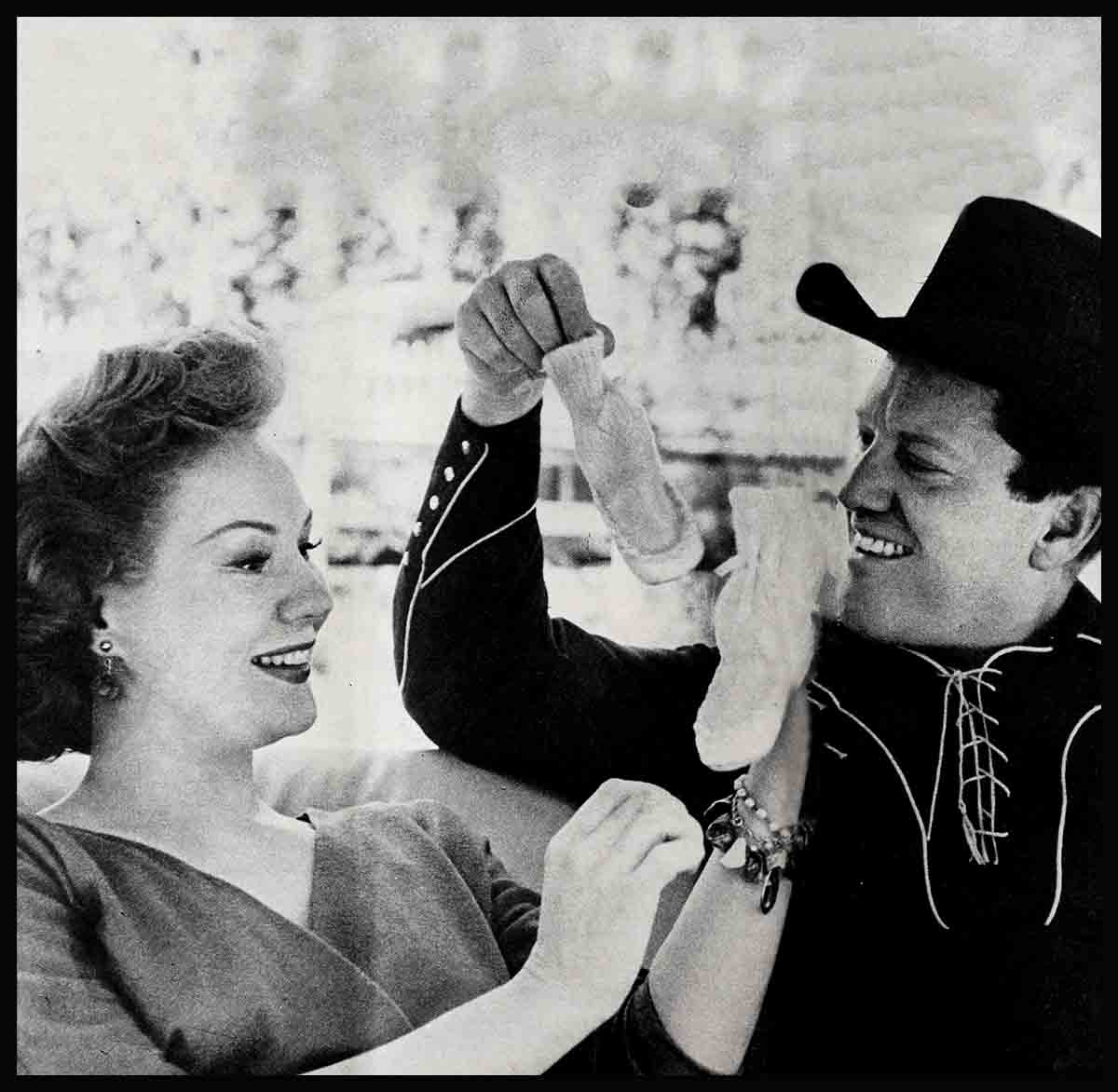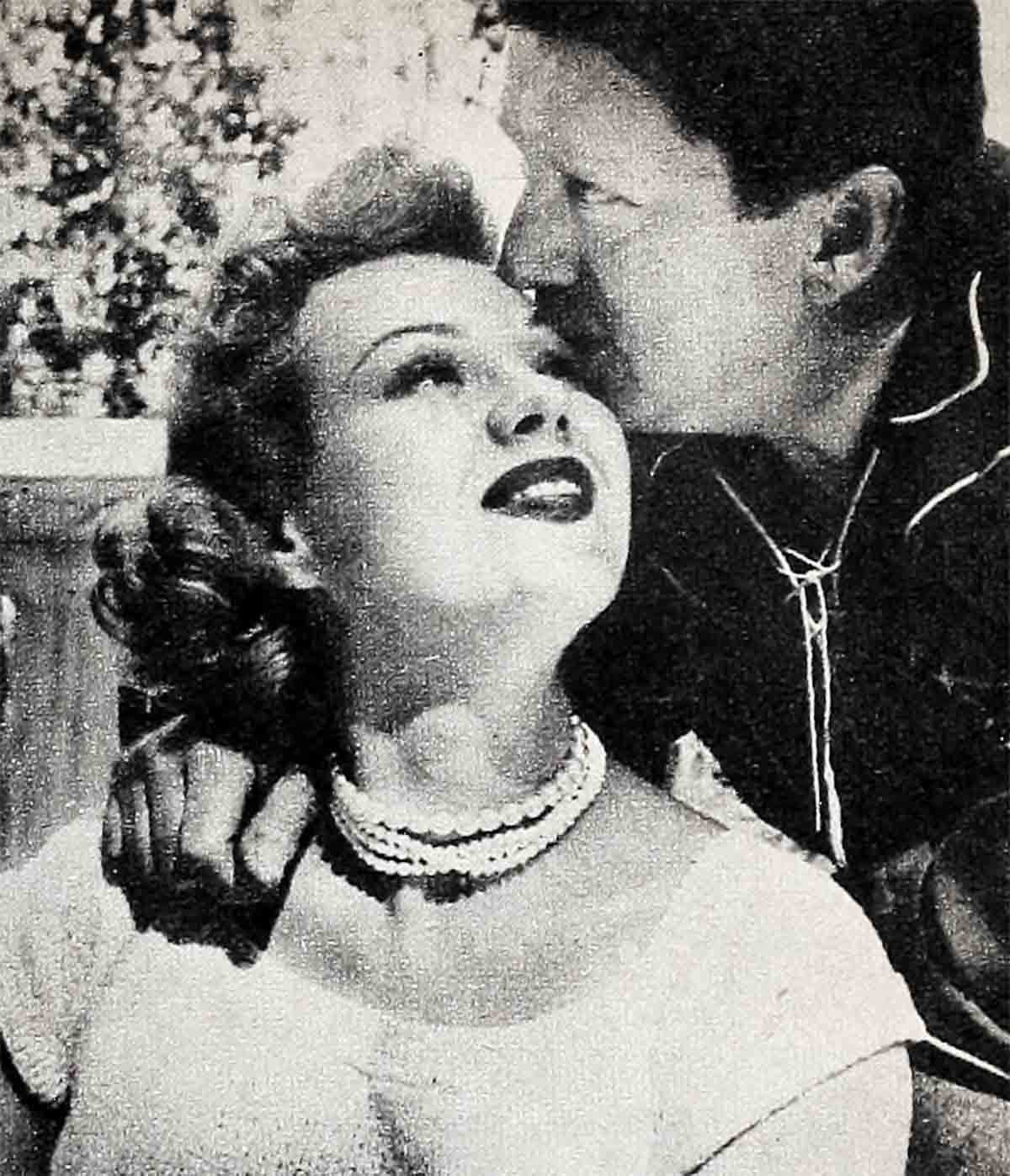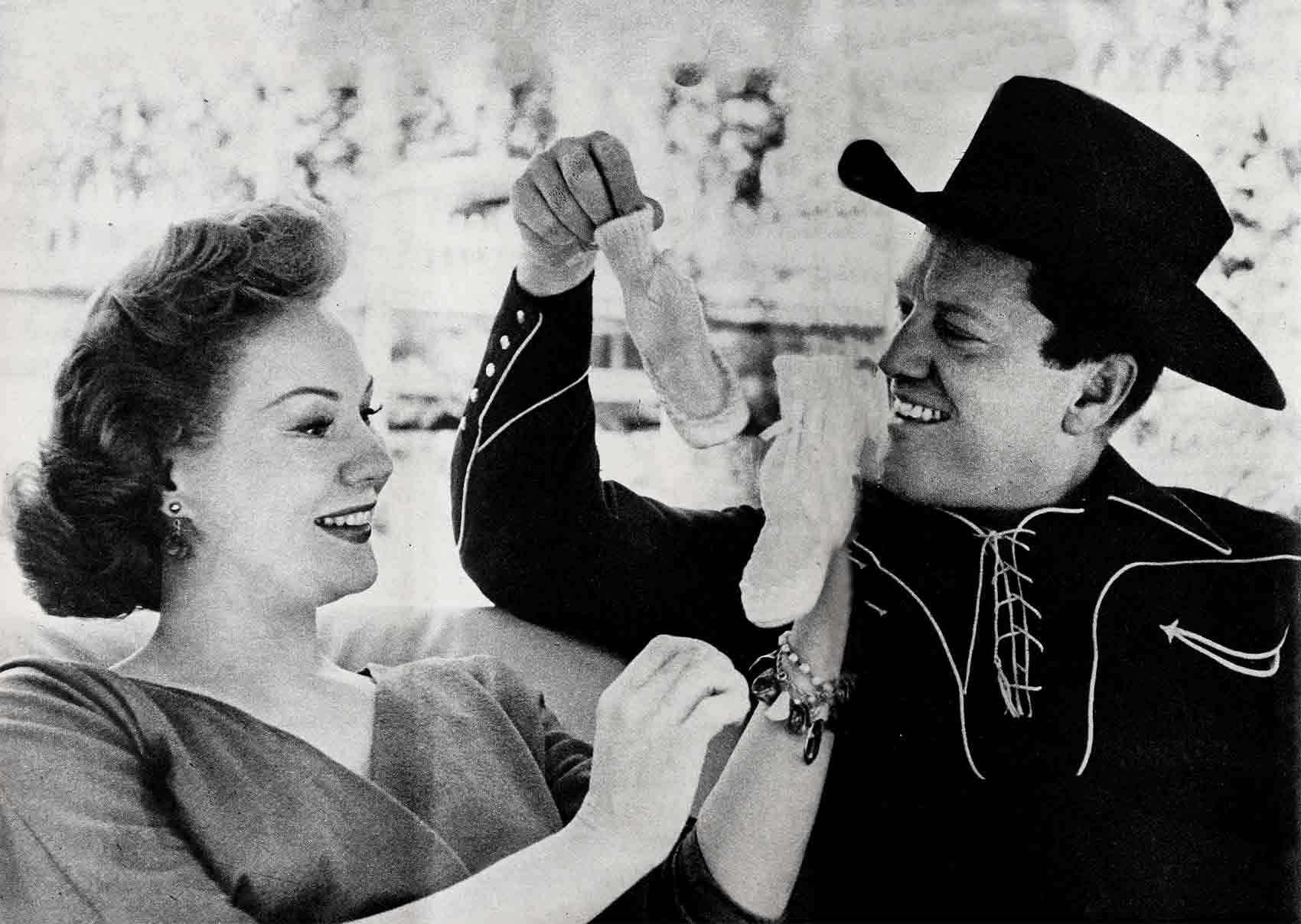
Oh, Baby!—Virginia Mayo & Mike O’Shea
The scene is the office of a Beverly Hills physician. The doctor is smiling broadly. His nurse says ecstatically, “Isn’t it the most wonderful news?”
In a chair facing the desk sits a beautiful girl, looking slightly dazed. “I still think somebody. made a mistake,” she answers.
Easily the calmest person in the room is her husband, a big, rough-haired individual named Mike O’Shea. “I was almost sure,” he remarks. “She’s been looking different lately. Besides, I’ve been having morning sickness almost every day.”
End of scene. After six childless years of marriage during which they have longed to be parents, Virginia Mayo and Michael O’Shea have been informed that at last they will be—probably in late October.
What does the happy couple do on such a great occasion? Does the expectant father buy gifts? Do they go out and celebrate with champagne—or go home and hold hands in front of the open fire? “Sure, I bought: her a present,” says Mike. “I went right downstairs, over to the corner pharmacy and got her some calcium for Building Strong Teeth and Sturdy Bones.”
“And then we went and looked at houses,” adds Virginia. Not, she explains, that they intend to buy a new one; she just likes to look at houses. For the coming of the baby they will add to their own charming home in Van Nuys, as soon as they find an architect “to expand the house upward.” Because of the existing floor plan they cannot sensibly spread the house out any further, so a second story will be built over the wing containing Virginia’s bedroom.
She still can’t believe it’s true, even though her doctor has been treating both O’Sheas for more than a year with the express purpose of making parents of them. He says it was not medication but common sense that brought about fulfillment of the dream. “A sensible diet, a normal routine of living, and the normal thing happened.”
“But,” says Virginia, “I don’t feel different and, even if Mike says I do, I don’t look different to myself.” She does tire more easily these days, though, and is more inclined to lethargy.
Now that the first is on the way, Virginia wants six children. “Children adjust better when they have brothers and sisters,” she says, “and I think it’s healthier for the parents, too.”
Would they like to have the babies as close together as possible or spaced out? “Spaced out,” says Mike. “One a year.”

Mrs. O’Shea wants a girl first, largely because Mr. O’Shea wants same; he considers boys overrated by far. And they both favor old-fashioned names. “People are really going nuts with crazy names,” Mike points out. “Piper, Joni, Rock.
“You know, I spent six months in Ireland once,” said Mike, “and I never met one Derrick or one Kevin. Everybody was Cholly or Joe or Willie.
“I want to name my daughter something simple, like Mary Catherine, and call her Kate. I had an ancestor—ancestress, rather—named Kate O’Shea who had a little something going with a guy named Parnell,” Mike says, eyes twinkling. “So maybe if we have a son instead, we should call him Parnell in commemoration.”
“Mary Catherine O’Shea,” repeats Virginia experimentally. “Catherine Mary . . . Kate O’Shea.” She looks pleased.
Impending motherhood has already made one welcome change in Virginia’s life—she’s taking a real vacation for the first time in years. With “South Sea Woman” and “Devil’s Canyon” finished, she plans no new pictures until after the baby’s birth; in the interim months she will stay home rather than seek out fashionable vacation spots. “I just like to sit here. People are always asking me what I do between pictures, and they think it’s funny when I tell them that I just sit. I know lots of actors and actresses who work harder at one hobby after another than they do on a picture. I love my home and my husband and our life together, and my hobby is thinking about them, enjoying them. And that’s what I do when I say I’m just sitting.” It’s a wise girl indeed who savors the present happy moment, who doesn’t take it for granted while it’s here, and then, after it’s gone, looks back on it wistfully.
There is one trip that Michael O’Shea wants very much to take before the baby comes. That trip is to the altar of St. Patrick’s Cathedral in New York, where he and Virginia will kneel and repeat their marriage vows before their good friend, Bishop Fulton Sheen.
In the years of their marriage, the fact that Virginia is a Presbyterian and Mike a Catholic has never been an issue. “We don’t think it matters what you call yourself,” they feel. It’s true that last year Virginia took instruction from Bishop Sheen, but whether she will become a convert to Catholicism is a decision she is not yet ready to make. The possibility has met with opposition from her family and, of course, her own church; and Mike is too sensitive a guy to press the point.

Actually, it isn’t necessary for her to become a Catholic in order to be married in the church. As long as she agrees that her children be raised in the faith, she can be married by the Bishop and still remain a Protestant if she wishes. Also, contrary to current fable, it is not necessary for Mike to receive special dispensation for this marriage. As he and his first wife were also wedded outside the church, neither the marriage nor subsequent divorce is recognized, and there is therefore no religious obstacle to overcome. Now as always, religion is not a danger area in the life of the O’Sheas; they simply intend to renew their vows in the holy ceremony for the sake of the coming child.
Mike teases her a little, of course. “Virginia,” he’ll ask, “what is my autographed prayer book from the Bishop doing in your heathen bedroom?” But . . . he wouldn’t be Mike if he weren’t teasing about something, and she wouldn’t be Virginia if she minded.
They share very definite views on the care and upbringing of little O’Sheas—old-fashioned views that have nothing to do with tomes on child psychology. “First time he acts up, I’m gonna belt ’im one,” says Mike. “Then I’ll wake him up and tell him why.
“No, seriously, all you have to do is use horse sense. What’s wrong with most kids is their parents. A couple has a kid, and it’s a novelty to teach him tricks, like a trained dog. Guests come to the house, and right away Sam’s got to recite his little poem or do his little tap dance for the nice people. He gets used to it. Then the novelty wears off. Sam’s at the awkward age. Or they’ve got a new baby or everybody they know has heard Sam’s poem.
“So what does this mean to Sam? He isn’t old enough to figure things out for himself, and nobody sits down and explains it to him. All he knows is that he used to be the center of attention and he’s not, anymore. But he finds out that if he says dirty words or throws the oatmeal at his mother, he gets plenty of attention. First thing you know, old Sam’s a problem child—only, he isn’t. He’s a normal kid with problem parents.”
“Well, there are other things, too,” Virginia adds.
“Yeah. The second thing wrong with kids is grandparents. First time I rap Sam and my mother-in-law starts babying him, I’m gonna belt her on the ear, too.”

Virginia is unperturbed by the suggestion that her maternal parent might come to bodily harm. “She’s quite strict with my brother’s children,” she reminds Mike.
“And that has to go, too,” says Mr. O’Shea. “Kids get confused when too many people give them orders. There has to be a headquarters, and here that’s us.”
In case anyone is thinking of forming a Society for the Prevention of Cruelty to Unborn Tots, let it be pointed out that the sound and the fury of Mike O’Shea signifies nothing at all. He makes black Irish threats to his stallion, to the four dogs and, in all probability, to his beautiful wife. But there is no cowering at the master’s approach to indicate that he has ever carried out one of those violent threats. Every living thing on the place, man and beast, responds to the charm of the guy, even when he’s making menacing noises. Particularly then, knowing that this is how he shows affection.
It was even suggested that he’ll spoil the daylights out of the baby, but Virginia doesn’t think so. “Spoiling them at home just makes it more difficult for them to get along with the rest of the world. Mike’s more responsible than that, and I feel the way he does. I’d rather spoil the dogs and train the children. They’ll know how much they’re loved and wanted—but discipline has to start somewhere, at some time. Where’s a better place than at home with the parents who love you?”
Young Kate—or Old Sam, as the father calls the expected baby, with generous disregard for his own fond hopes—will grow up in an atmosphere that’s astonishingly normal. The O’Shea home, one of the loveliest in glittertown, has no swimming pool, no tennis court, no standard star stuff, but it has enormous charm. Virginia and Mike live quietly, comfortably, and as decent people should. The entertaining they do is without fanfare. They’re early-to-bed people, even when Virginia isn’t working on a picture, because Mike is a man who gets up at five o’clock in the morning. Habit, he says—and besides, it’s the most beautiful hour of the day.
At home, Young Kate will find it difficult to learn that she is the child of a famous couple. She is doubly blessed with the parents she will have. Not because her mother is Warners’ biggest star, but because her mother is so matter-of-fact about herself and her career. It isn’t that Virginia takes any of the wonderful things that have happened to her for granted. She doesn’t. But she is simply incapable of suffering delusions of grandeur. If Young Kate ever sees her mother putting on airs, you can bet that it will be on the screen.
She’ll learn about acting from the inimitable clown who is her father. Mike O’Shea would probably find it impossible to tell a story without acting out every role—and he tells a wonderful story. He’s a brilliant, entertaining conversationalist and, despite having left school in the fifth grade, one of the best-read men in Hollywood. A humble man. Young Kate will see him working about the place in faded levis, planting the honeysuckle her mother loves, repairing a fence, giving the hired help a hand with the chores. A big man, without false pride.
Young Kate will leave St. John’s Hospital in Santa Monica, where she is scheduled to make her debut, for a home in which there is balance and serenity and much love. Admirable qualities, hard fought for and won, for the O’Sheas have had no story-book time of marriage. They have had as many problems as any couple in Hollywood; the only difference is in the way they coped with theirs and the intelligent adjustments they were able to make. Because of love.
And, Kate O’Shea . . . to be sure to bring your sense of humor with you. There’s a funny man in the house, you know. When one girlish interviewer sought his reaction to your coming, he said with a straight face that he thought puppies were cuter than babies. She actually believed him. But you won’t have to know him long to learn when he says a thing like that it’s just a gag. He told another writer that it was too bad your estimated time of arrival conflicted with the World Series; he was going to miss greeting you, he said. And that was his idea of a joke, too.
Then, there’s the matter of that name, Sam. Your father had been visiting a Texas cattleman who had a servant named Sam. Pronounced, Texas style, Syam. Your father was delighted; he rolled those syllables around on his tongue for days. It was about that time that your parents learned about you. When a columnist called to ask what your name would be, your father solemnly said, “Ah think we’ll call ’im Syam O’Shea.”
And he might at that. It’s going to be fun.
THE END
—BY RICHARD LEON
It is a quote. PHOTOPLAY MAGAZINE SEPTEMBER 1953




